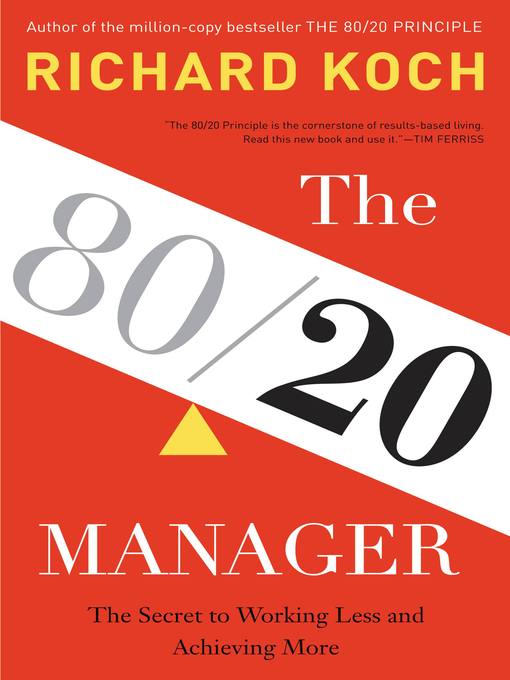
The 80/20 Manager
The Secret to Working Less and Achieving More
کتاب های مرتبط
- اطلاعات
- نقد و بررسی
- دیدگاه کاربران
نقد و بررسی

August 26, 2013
This follow-up to 1999’s The 80/20 Principle covers the ways in which managers can apply the Pareto Principle: 80% of results come from 20% of our efforts. Entrepreneur and investor Koch argues that managers need to work more effectively, rather than simply working more, and that putting in enormous effort is the least effective way to get results. The declining economy and resulting layoffs have resulted in many overworked employees, and busywork and unnecessary e-mails aren’t helping. Koch urges overwhelmed managers to forget about the minutiae of process and instead focus on output, working with their teams to do the same. These principles will allow followers to do more in less time, and to simplify tasks and work. Koch provides a step-by-step guide to greater efficiency, helping readers with topics including mentoring, leveraging influence, finding meaning and direction, developing strategy, and consistently pursuing the biggest goals with the smallest effort. A true 80/20 manager, according to Koch, is relaxed, happy, and full of energy, and works reasonable hours. In fact, claims Koch, if more managers adhered to the 80/20 principle, the result would be a richer and more results-focused world. This easy-to-follow, substantive work helps readers develop a managerial style that’s truly worthwhile.

September 1, 2013
Koch (The Star Principle: How It Can Make You Rich, 2010, etc.) discusses how to successfully apply his "80/20 principle" to business management and leadership. The author believes that "if you divide the world into causes and results," then relatively few causes bring about most of the results. He names the phenomenon the "80/20 principle," modeled on a similar concept formulated by Italian economist Vilfredo Pareto more than 100 years ago. Koch applies the rule to current business practices. He does not believe that running businesses using accounting methods alone stands much chance of success, and he insists that one of "the most harmful, ridiculous, idiotic, yet enduring assumptions of the business world is that all sales are good, all revenue is valuable, and all sources of revenue are of roughly equal importance." At Filofax, a company he rescued, Koch found that just 4 percent of stock-keeping units generated 93 percent of revenue and 20 percent of profits, while one-fifth of the customers accounted for 91 percent of sales. The author distills lessons from this and other cases into a 10-point system designed to help managers recognize where they can obtain the greatest results from the application of the 80/20 principle. These include developing investigative skills, building networks and connectivity, mentoring and using leverage. Koch enriches his arguments with references to his own experiences at the Boston Consulting Group and Bain & Company. The author advocates "time rich" methods (effective use of time), arguing that there is a negative relation between work time and productivity. He takes pains to separate this view from time management and seeks to cultivate the management skill of "calculated inactivity." A lively presentation that effectively combines ways to improve leadership with business problems and solutions.
COPYRIGHT(2013) Kirkus Reviews, ALL RIGHTS RESERVED.

September 15, 2013
In the new work environment in which managers have more work and less resources, The 80/20 Manager convincingly guides leaders on how to get the desired results from their teams without excessive effort. Managers who feel overwhelmed by their workloads may want to try some of the techniques presented in the book, such as selecting and completing one priority daily before giving in to email and other distractions. The book is built on the premise of the 80/20 rule and how to apply it to reduce the clutter and achieve more focused and productive results. As Apple's iPod capitalized on the 20 percent of features that 80 percent of users actually use, managers can employ similar techniques. Building on his The 80/20 Principle (1997), Koch presents 10 ways to be an 80/20 manager, including how to be a superconnecting manager, a liberating manager, a time-rich manager, or a simplifying manager like Alan Mulally of Ford. These simple, practical techniques can be tried individually or together, although some may not work for everyone. Good advice of widespread appeal.(Reprinted with permission of Booklist, copyright 2013, American Library Association.)

























دیدگاه کاربران